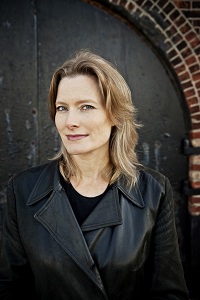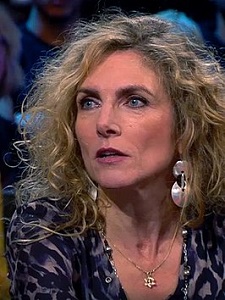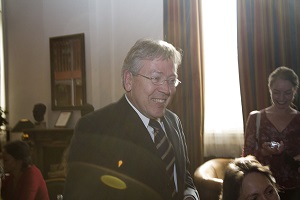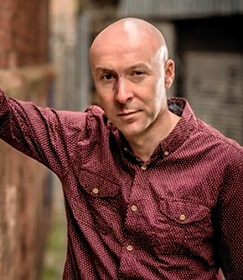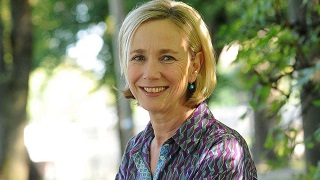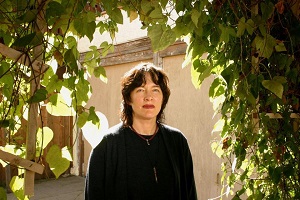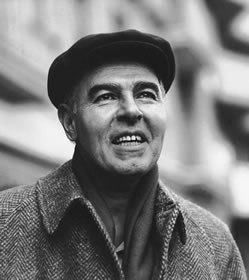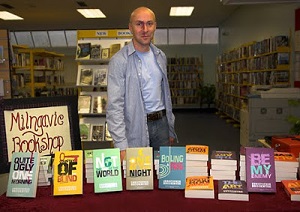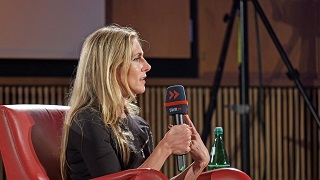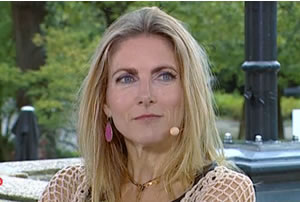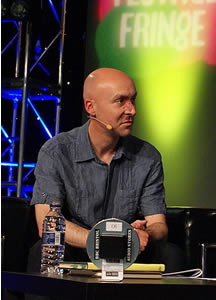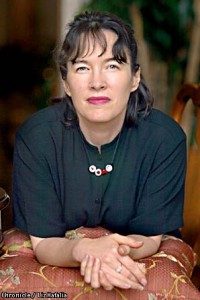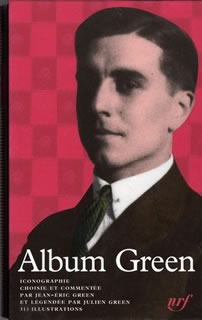De Amerikaanse schrijfster Jennifer Egan werd geboren in Chicago op 6 september 1962. Zie ook alle tags voor Jennifer Egan op dit blog.
Uit: Manhattan Beach
“More than one girl had wept, describing her terror that a husband or fiancé would not return. Anna couldn’t listen. The talk stirred in her an uncomfortable anger at these girls, who seemed so weak. Thankfully, Mr. Voss had put an end to that topic during working hours, prompting an unlikely trill of gratitude in Anna. Now they sang songs from their colleges while they worked: Hunter, St. Joseph’s, Brooklyn College, whose song Anna finally learned—not having bothered to in the year she was a student there.
She
synchronized her wristwatch with the large wall clock they all answered
to, and stepped outdoors. After the sealed hush of her shop, the roar
of Yard noise always shocked her: crane and truck and train engines; the
caterwaul of steel being cut and chipped in the nearby structural shop;
men hollering to be heard. The stench of coal and oil mingled with
gusts of chocolate from the factory on Flushing Avenue. It wasn’t making
chocolate anymore, but something for soldiers to eat when they might
otherwise starve. This chocolate cousin was supposed to taste like a
boiled potato, Anna had heard, so that soldiers wouldn’t be tempted to
snack on it ahead of time. But the smell was still delicious.
As she
hurried alongside Building 4, the structural shop, with its thousand
dingy windows, she saw a girl climbing onto a bicycle. Anna didn’t
register at first that it was a girl; she wore the same plain blue work
clothes they all did. But something in her bearing, the flair with which
she mounted, caught Anna’s eye, and she watched the girl glide away
with a shiver of envy.
At
a canteen near the piers, she bought her forty-cent boxed meal—today it
was chicken, mashed potatoes, canned peas, and applesauce—and made her
way toward Piers C and D, both close enough to her shop that she could
eat (often while standing, even walking) and be back on her stool by
twelve-fifteen. A ship had berthed at Pier C since the previous day, its
sudden towering apparition almost otherworldly. With each step Anna
took toward the ship, its height seemed to rise, until she had to tip
her head fully back to follow the curved prow all the way up to the
distant deck. It was thronged with sailors, identical-looking in their
toylike uniforms and caps, all leaning over the rail to gawk at
something below. In that same moment, a chorus of catcalls reached her.
She went still, clutching her boxed lunch—then saw with relief that the
object of their ardor was not her but the girl on the bicycle, who was
riding back alongside the ship from the foot of the pier, a tousle of
peroxide curls pried from her scarf by the wind. Anna watched her
approach, trying to discern whether the girl was enjoying this attention
or not. Before she could make up her mind, the bicycle hit a patch of
gravel and skidded on its side, dumping its rider onto the brick-paved
pier, to the jeering hilarity of the sailors. Had the men been within
reach of the girl, they doubtless would have elbowed each other aside to
rush to her aid. But at such a height, with only each other to show off
for, they settled for an orgy of heckling:
“Aw, poor baby lost her balance.”

Cover
De Nederlandse schrijfster Jessica Durlacher werd geboren in Amsterdam op 6 september 1961. Zie ook alle tags voor Jessica Durlacher op dit blog.
Uit: Schrijvers!
“In de auto zuchtte ik zo ontzettend dat Marvin meteen deed wat ik had gehoopt: hij vroeg wat er was. Hij vroeg het kil, niet alsof hij het werkelijk wilde weten. Ik vroeg hem of hij dan niet wist wat er was. Ik vroeg het zo dreigend als ik kon. En daarna zuchtte Marvin op zijn beurt. Ik moest wel schreeuwen. Wat, brulde ik, kon er in godsnaam de reden van zijn dat hij zuchtte? En toen maakte de auto een raar geluid, een soort moedeloze plof die ons kortstondig door elkaar schudde. Marvin stopte, midden op straat. Ik keek naar buiten. We hadden nog maar een meter of dertig afgelegd. `Lekke band,’ zei hij. En stapte uit. Pas toen ik Marvin de krik uit de laadruimte zag halen, begreep ik wat die woorden betekenden. Heel even drong de gedachte zich op dat ik met mijn geschreeuw de band van zijn auto lek had gestoken. Ik stapte ook uit.
De krik was roestig en weigerde in de gewenste stand gebogen te worden. Ik kon Marvin niet helpen. Langzaam kwam ik bij mijn positieven. Toen besefte ik dat de identiteit van de schuldigen voor de hand lag. Vastbesloten liep ik terug om aan te bellen bij de giechelende watergooiers. Ik moest driemaal bellen. Een voor haar leeftijd te jeugdig geklede vrouw verscheen in de deuropening. `U beschuldigt mijn kinderen van vandalisme?’ concludeerde ze na mijn relaas. Haar stem klonk koud. Nou…’ vervolgde ik, vriendelijk doch ferm, ‘ik vroeg mij af of u heeft gemerkt dat er van de derde verdieping van uw huis volle zakken water naar beneden zijn geworpen. Er klonk gegiechel…’ `Mijn zoons zijn boven, met vrienden. Ik zal ze roepen.’ Twee spottende gezichten, jong en trots. Het waren jongens van een jaar of veertien. Ik probeerde ze me voor te stellen met een priem, een mes, een spijker — de lol van het vernielen. Ook het hoofd van een derde jongen werd heel kort zichtbaar. `Dat van die waterzakken — dat hebben we gezien,’ zei ik. Dat waren jullie. Maar nu is onze band ook lek.’ De moeder bleef erbij staan. Onbewogen nam ze haar zoons op, daarna mij. Wat vervelend,’ zei de jongen met het keurigste gezicht. ‘Daarnet was er ook al een man aan de deur die een lekke band had. Maar wij hebben dat dus echt niet gedaan!’
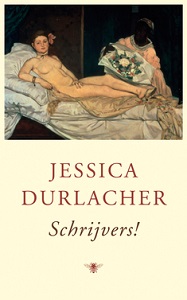
Cover
De Nederlandse dichter en schrijver Aart G. Broek werd op 6 september 1954 geboren in Maasland. Zie ook alle tags voor Aart G. Broek op dit blog.
Uit: Benoem Zwarte Piet voor het leven
“ONHOUDBAAR / Bizar
genoeg gaat het debat over Zwarte Piet uit van een onhoudbaar doel:
‘maak Sinterklaas weer speciaal voor iedereen!’ Het sinterklaasfeest is
helemaal geen feest speciaal voor iedereen en zal dat ook nooit kunnen
zijn. Onze multiculturele samenleving staat bol van (al dan niet
religieus gevoede) festiviteiten, manifestaties en uitingen van zeer
uiteenlopende aard.
Het is ondoenlijk van iedereen in Nederland te
verlangen dat hij/zij zich zonder meer kan vinden in elk ervan. Er is
geen festiviteit of manifestatie of er is wel meer of minder gegronde
kritiek op te leveren. Vrijwel altijd is er sprake van een vorm van
discriminatie, vanwege levensovertuiging, politieke gezindheid,
godsdienst, ras, geslacht en wat al niet meer.
DREADLOCKS
/ Een willekeurig voorbeeld: wordt het geen hoog tijd een gevecht aan
te gaan tegen het dragen van dreadlocks? Het laten groeien van het
kroezige haar tot woeste manen vormt namelijk hét symbool van
dictatoriale macht, uitbuiting en racisme.
Voor de religieuze
beweging van het rastafarianisme, ontstaan in Jamaica, is het dragen van
dreadlocks een symbolische toenadering tot hun god. Die god wordt
algemeen Jah genoemd en betreft Haile Selassie, ofwel Ras Tafari, de
Overwinnende Leeuw van de stam van Juda (en nog een reeks van
eretitels). In de haardracht van dreadlocks imiteert de rastafariër de
manen van de leeuw en verbindt zich zodoende met de geest van de leeuw
van Juda. Daarenboven onderstrepen de ‘manen’ de dominante rol die de
man in deze beweging speelt: vrouwen zijn er om kinderen te baren, te
koken en om te (be)dienen.
Het rastafarianisme heeft naast deze
‘zwarte god’ nog als basisprincipes dat blanken inferieur zijn aan
zwarten en dat het zwarte ras voorbestemd is over de wereld te heersen.
Bob Marley heeft die ondergang op luchtige reggaeritmes en onder het
genot van ganja (hasj) bezongen.”

Zwarte Piet
De Schotse schrijver Christopher Brookmyre werd geboren op 6 september 1968 in Glasgow. Zie ook alle tags voor Christopher Brookmyre op dit blog.
Uit: Black Widow
“My trial has barely begun, and no testimony heard, but already I know that in the eyes of this court, I am an abomination. As I gaze from the dock and take in all the faces gazing back, I think of the opinions they have formed, the hateful things they have written and said. I think of how once it stung, but my skin has grown thicker over time, and I have worse things to endure now than mere words. They have to be respectful in their conduct within these walls: no shouting and barracking like when the van with its blacked-out windows pulled up outside the prisoners’ entrance, a desperate photographer extending a hopeful arm and firing blind with a flash gun as he pressed himself perilously close against the moving steel. One of these days the vehicle is going to run over one of those reckless idiots’ feet: several tons of G4S hardware degloving the flesh from crushed and shattered bones as it rolls across his instep, all in the service of striving for, at best, a blurry low-contrast image of some scared and wretched prisoner cowering inside. It would be a valuable illustration of the risk-benefit equation pour encourager les autres. To them, I am someone who ought to have been grateful for all that life apparently gifted me, not asked for more. I should have settled for what I was dealt, as it was generous enough in other people’s estimation. The actions I took in pursuit of my desires, to better my lot and to extricate myself from an intolerable situation, these were unforgivable, depraved. Society’s judgement is always harsher upon a woman who has done grave deeds to get what she wants: a woman who has challenged their values, violated the accepted order of things. It’s a crime against society, a transgression of unwritten rules that are far more precious than those inscribed in law. With this thought I glance across the room, and to my surprise feel a sorority even with the woman I came to regard as my enemy: the woman who laid me low, brought my deeds to light. In our own ways we both acted for the purest of reasons. Her I respect. Everyone else is merely white noise to me now. I do not expect anyone’s sympathy. I do not seek forgiveness from people who have never been tested like I was. I may be guilty, and I may be sentenced, but I will not be condemned: not by those who cannot understand. Nobody here can judge me until they know the whole truth. Until then, their opinions are no more than impotent angry words, and my, haven’t those been in spate since this business first came to light. Just think how they were exercised by the revelation that this bitch murdered her husband. The tone was one of boiling anger, and at the heart of it all was one single rhetorical question: How dare she. How dare she. There’s a thought: nobody ever asks ‘How dare he?’ when a man kills his wife. The coverage is coloured by sombre tones, its language muted and respectful. It’s like they’re reporting on a death from disease or calamitous mishap. ‘It’s dreadful, but it happens. Poor thing. So tragic,’ it seems to say. And like disease or disaster, the follow-up is about asking whether more could have been done. What signs were missed? What can we learn? By contrast there’s a conspicuous shortage of victim-blaming when it’s a husband who lies slain. `Why didn’t he leave her? He must have known what she might be capable of. There must have been indications that she was dangerous. I’m not condoning it, but surely he was aware of her triggers. There’s no excusing what she did, but it wouldn’t have happened unless he did something to provoke her.’ Said nobody ever. See, that’s what chills them. They can just about handle a crime of passion, a moment of madness.”
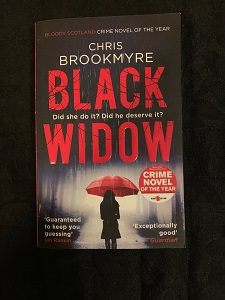
Cover
Zie voor nog meer schrijvers van de 6e september ook mijn blog van 6 september 2018 en ook mijn blog van 6 september 2017 en ook mijn blog van 6 september 2015 deel 2.

